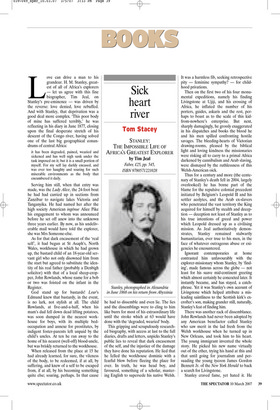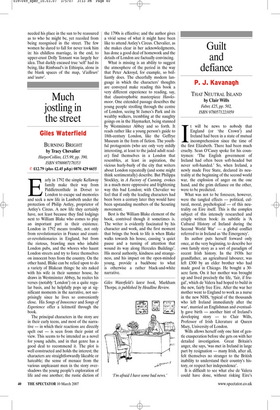Sick heart river
Tom Stacey
STANLEY: THE IMPOSSIBLE LIFE OF AFRICA’S GREATEST EXPLORER by Tim Jeal Faber, £25, pp. 545, ISBN 9780571221028 Love can drive a man to his grandeur. H. M. Stanley, greatest of all of Africa’s explorers — let us agree with this fine biographer, Tim Jeal, on Stanley’s pre-eminence — was driven by the reverse: love denied, love rebuffed. And with Stanley, that deprivation was a good deal more complex. ‘This poor body of mine has suffered terribly,’ he was reflecting in his diary in June 1877, closing upon the final desperate stretch of his descent of the Congo river, having solved one of the last big geographical conundrums of central Africa:
it has been degraded, pained, wearied and sickened and has well nigh sunk under the task imposed on it; but it is a small portion of myself. For my self lay darkly encased, and was ever too haughty and soaring for such miserable environments as the body that encumbered it daily.
Serving him still, when that entry was made, was the Lady Alice, the 24-foot boat he had had carried up in sections from Zanzibar to navigate lakes Victoria and Tanganyika. He had named her after the high society American ingénue Alice Pike his engagement to whom was announced before he set off anew into the unknown three years earlier. By now, as his undeliverable mail would have told the explorer, she was Mrs Someone-else.
As for that dark encasement of the ‘real self’, it had begun at St Asaph’s, North Wales, workhouse in which he had grown up, the bastard child of an 18-year-old ser vant girl who not only disowned him from the start but agreed to substitute the identity of his real father (probably a Denbigh solicitor) with that of a local sheep-crop per, John Rowlands, whose name for a bob or two was foisted on the infant in the Register.
God stand up for bastards! Lear’s Edmund knew that bastardy, in the event, is no lark, not stylish at all. The child Rowlands, at five-and-a-half, when his mam’s dad fell down dead lifting potatoes, was soon dumped in the nearest work house for boys, with its multiple bedoccupation and annexe for prostitutes, by indigent foster-parents left unpaid by the child’s uncles. At ten he ran away to the home of his nearest (well-off) blood-uncle, but was briskly returned to the workhouse.
When released from the place at 15 he had already learned, for sure, the vileness of the body, to be redeemed, if at all, by suffering, and knew of a self to be escaped from, if at all, by his becoming something quite else; soaring, perhaps. In that cause he had to dissemble and even lie. The lies and the dissemblings were to cling to him like burrs for most of his extraordinary life until the stroke which at 63 would have done with the ‘degraded, wearied’ body.
This gripping and scrupulously researched biography, with access at last to the full diaries, drafts and letters, unpicks Stanley’s public lies to reveal that dark encasement of the self, and the injustice of the damage they have done his reputation. He lied that he felled the workhouse dominie with a fearful blow before fleeing the place for ever. In truth, he was head boy, and favoured, something of a scholar, mastering English to supersede his native Welsh. It was a harmless fib, seeking retrospective pity — feminine sympathy? — for childhood privations.
Then on the first two of his four monumental expeditions, namely his finding Livingstone at Ujiji, and his crossing of Africa, he inflated the number of his porters, guides, askaris and the rest, perhaps to boast as to the scale of this kidfrom-nowhere’s enterprise. But next, sharply damagingly, he grossly exaggerated in his dispatches and books the blood he and his men spilled confronting hostile savages. The bleeding-hearts of Victorian drawing-rooms, pleased by the biblical light and loving kindness the missionaries were risking all to carry to a primal Africa darkened by cannibalism and Arab slaving, were dismayed by the ruthlessness of this Welsh-American oick.
Thus for a century and more (the centenary of Stanley’s death fell in 2004, largely overlooked) he has borne part of the blame for the repulsive colonial precedent initiated by Belgium’s Leopold II and his settler acolytes, and the Arab ex-slavers who penetrated the vast territory the King acquired for himself by stealth and deception — deception not least of Stanley as to his true intentions of greed and power which Leopold dressed up as a civilising mission. As Jeal authoritatively demonstrates, Stanley remained stalwartly humanitarian, ever true to his men, in the face of whatever outrageous abuse or exigencies he encountered.
Ignorant contemporaries at home contrasted him unfavourably with the explorer-missionary whom Stanley, by ‘finding’, made famous across the globe — not least for his suave mid-continent greeting which almost certainly he concocted later. It instantly became, and has stayed, a catchphrase. Yet it was Stanley’s own account of Livingstone which helped attribute a misleading saintliness to the Scottish kirk’s excrofter’s son, making grander still, naturally, Stanley’s feat of finding him.
There was another rack of dissemblance. John Rowlands had never been adopted by any American benefactor called Stanley who saw merit in the lad fresh from the Welsh workhouse when he turned up in New Orleans, and took him to his heart. The young immigrant invented the whole story. He picked his new name virtually out of the ether, trying his hand at this and that until going for journalism and persuading the young tycoon James Gordon Bennett Jr. of the New York Herald to back a search for Livingstone.
Stanley craved fame, yet hated it. He needed his place in the sun to be reassured as to who he might be, yet recoiled from being recognised in the street. The few women he dared to fall for never took him in: his childless marriage, in the end, to upper-crust Dolly Tennant was largely her idea. That darkly encased true ‘self’ had its being, like Rimbaud’s in Ethiopia, alone in the blank spaces of the map, ‘d’ailleurs’ and ‘autre’.



























































































 Previous page
Previous page